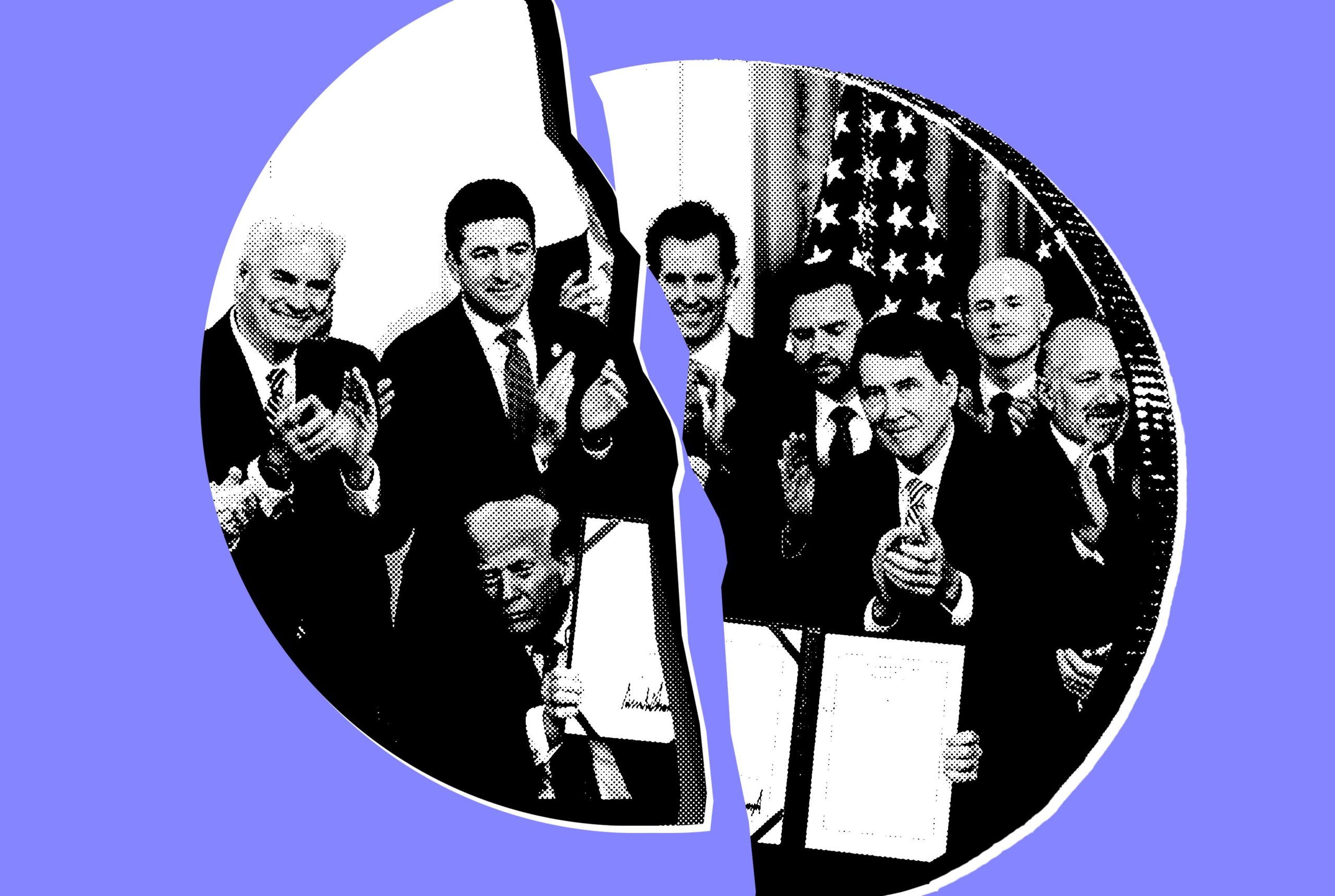As with any fledgling romance, Trumpworld and big money cryptocurrency interests were bound to have their first fight at some point.
It was late June heading into July, and two highly anticipated bills were in the pipeline to help fulfill President Donald Trump’s promises to make the US the “crypto capital of the planet” and usher in what his supporters believed would be a “golden age” of digital assets. Congress had one shot at passing something before the August recess.
Coinbase, the cryptocurrency exchange, and Andreessen Horowitz, the venture capital firm known as a16z, were, according to two Republicans involved in the negotiations, calling around to members to see if they could combine components of the two bills, known as the GENIUS Act and the CLARITY Act. The former more narrowly covered the realm of stablecoins; the latter was a more ambitious overhaul of how crypto products are regulated more broadly. Joining them together would give the industry what it failed to get during President Joe Biden’s term—a comprehensive framework that would give the industry regulatory certainty and a clear path to profit, legally, off of these digital assets for the foreseeable future.
But the White House was not happy, and made sure to let the two power players know it. To the Trump administration, this attempt at political maneuvering was slowing down a much awaited win for crypto.
“We said, you’re just fuckin’ wrong,” a senior administration source involved in negotiations over crypto legislation tells me, requesting anonymity to describe private deliberations over the two most significant pieces of legislation for the industry.
“They were being hissy pissy about the way to do things,” the senior administration official says. “But you know, it’s not just their call.” The White House promised the firms they’d get their more prized regulatory overhaul—but it would be separate, and they’d have to wait.
Coinbase, Andreessen Horowitz, and the White House did not return requests for comment.
It’s been pretty clear for quite some time: Trumpworld loves crypto. Almost everywhere you look in the second Trump administration, there’s a crypto connection. The president, most notably, has his own memecoin, and his two eldest sons, Eric and Don Jr., are involved in a variety of crypto ventures, including World Liberty Financial and its stablecoin.
Despite cryptocurrency being immensely profitable for the Trump family and vice versa, though, cracks are beginning to emerge in a key alliance that helped bring the president back to power. The dustup around stablecoin and market structure legislation could be the first preview of more fissures to come.
It doesn’t have the flair, the trappings, the egos, or the household name personalities of the Musk-Trump breakup, and the gripes involved aren’t necessarily even about ideology or policy.
But this brewing lovers’ quarrel does say something about how power works in Trump 2.0, and it very well could have far-reaching implications for the global economy.
You Can’t Always Get What You Want
At this time last year, Trump was successfully digging his campaign out of a fundraising cash crunch as former vice president Kamala Harris took over as the Democratic nominee. While Harris would revive sagging donor sentiment in her party, millions had been pouring into what was then known as the Save America PAC, which until then had covered many of Trump’s legal expenses.
Much of what shifted crypto’s attitude towards the GOP was vibes based. Sources of mine in Trumpworld and in the crypto community said they felt the Biden administration and Democratic Party more broadly were overly hostile to blockchain-based businesses.
“The crypto community was almost libertarian and apolitical for a while,” my source tied into the donor space tells me. But as the business grew under the Biden administration, more regulation by enforcement occurred—the Securities and Exchange Commission, or SEC, brought at least 83 crypto-related enforcement actions, initiating lawsuits against companies like Coinbase and Kraken, according to Reuters, arguing that their products should be regulated like securities—and donors felt “an animosity” from the White House that pushed them into Trump’s coffers, they explained. (Months into the second Trump administration, those lawsuits were dismissed.)
However, sources in both Trumpworld and on the blockchain side of the equation tell me crypto donors have become impatient with the return on their investment from the campaign, which came in at just under $250 million raised by crypto-aligned and related PACs and super PACs when all was said and done. Getting their favorite parts of both the GENIUS Act and the CLARITY Act over the line—including what they viewed as more favorable regulation under the Commodity Futures Trading Commission, rather than the SEC—was an opportunity to cash in.
This is where Coinbase and a16z got involved. Both firms have key connections in Trump’s orbit—most notably, respectively, Chris LaCivita, the former 2024 Trump co-campaign manager, works on the global advisory council for Coinbase, while a16z is cofounded by Marc Andreessen, the Silicon Valley billionaire and cocreator of the modern web browser, who wields influence primarily through Vice President JD Vance. These power players wanted to effectively merge the stablecoin bill with the more ambitious and wide-reaching CLARITY Act, according to two sources familiar with the proceedings.
Coinbase specifically ruffled feathers in the House GOP conference, another Republican operative in Trumpworld tells me. “It was one of those things with, if you’re gonna throw your weight around … at the end of the day they wasted two weeks of the legislative calendar by slowing everything down.”
Another sticking point, the senior administration official and GOP operative tells me, is around Coinbase appearing too chummy with Democrats after bringing on David Plouffe, the former Obama and Harris strategist, to join the organization’s global advisory council in addition to LaCivita and others.
Even though plenty of industries depend on maintaining relationships with lawmakers in both parties, Trumpworld has grown increasingly wary of any perception of camaraderie between the crypto crowd and Democrats, with Plouffe being the most prominent example.
“If [Democrats] take power again, you’re not getting shit,” says the senior administration source, “and all of your bets are wasted.”
The message from Trumpworld to the crypto community heading into the next phase of legislation is simple: Play by our rules, or good luck getting anything from a possible future Democratic-controlled Congress and White House.
“These guys just need to understand that if they stick with us they have a good chance of success—rowing against us will almost guarantee failure,” the administration source tells me.
“And they shouldn’t play both sides beyond getting the bare minimum of Democrat votes on legislation … They should wake up.”
Underneath all the wrangling is the substance of the legislation—even if the legislative gambit had been successful, it may have ultimately backfired. “It’s a case of be careful what you wish for,” says James Angel, a finance professor at Georgetown University. “The problem with the CLARITY Act is this tremendous lack of clarity that it really gives us.” It’s still unclear where the CFTC authority ends and the SEC’s begins under the proposed law, according to Angel.
And either way, he says, the evangelists shouldn’t be surprised if the CFTC ultimately cracks down on crypto as well.
As for the rough-and-tumble of getting legislation through Congress, the senior administration source says this is a welcome-to-the-club moment for the crypto community.
“Welcome to Congress,” the official says. “You’re just one of many who’s been chewed up and spit out.”
This is an edition of Jake Lahut’s Inner Loop newsletter. Read previous newsletters here.




